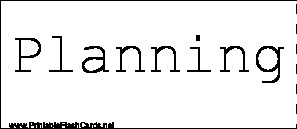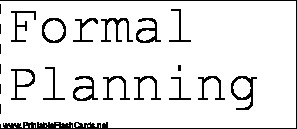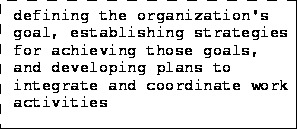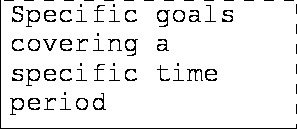

Managers can learn to do long-term planning for companies with these director flash cards
There are 20 flash cards in this set (4 pages to print.)
To use:
1. Print out the cards.
2. Cut along the dashed lines.
3. Fold along the solid lines.
Sample flash cards in this set:




| Questions | Answers |
|---|---|
| Planning | defining the organization's goal, establishing strategies for achieving those goals, and developing plans to integrate and coordinate work activities |
| Formal Planning | Specific goals covering a specific time period |
| Four reasons for planning | Provides direction Reduces uncertainty Minimizes waste and redundancy Sets the standard for controlling |
| Goals | desired outcomes or targets |
| Plans | documents that outline how goals are going to be met |
| Financial Goals | related to the expected internal financial performance of the organization |
| Strategic Goals | related to the performance of the firm relative to factors in its external environment (e.g., competitors). |
| Strategic plans | plans that apply to the entire organization and establish the organization's overall goals |
| operational plans | plans that encompass a particular operational area of the organization |
| Long-term plans | plans with a time frame beyond three years |
| Short-term plans | plans covering one year or less |
| Specific Plans | plans that are clearly defined and leave no room for interpretation |
| Directional plans | plans that are flexible and set out general guidelines |
| single-use plan | a one-time plan specifically designed to meet the needs of a unique situation |
| standing plans | ongoing plans that provide guidance for activities performed repeatedly |
| traditional goal-setting | an approach to setting goals in which top managers set goals that then flow down through the organization and become subgoals for each organizational area |
| means-ends chain | an integrated network of goals in which the accomplishment of goals at one level serves as the means for achieving the goals, or ends, at the next level |
| formal planning department | a group of planning specialists whose sole responsibility is helping to write organizational plans |
| competitor intelligence | screening information to detect emerging trends |
| competitor intelligence | gathering information about competitors that allows managers to anticipate competitors' actions rather than merely react to them |